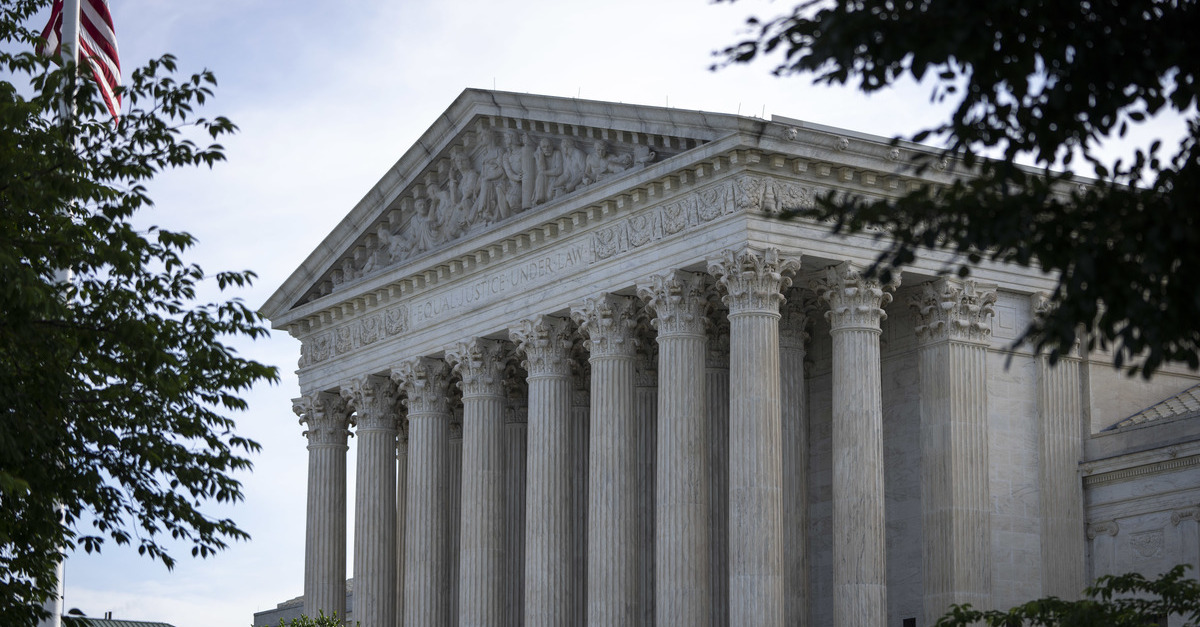
Eight years after the U.S. Supreme Court declared a key requirement of the Voting Rights Act unconstitutional, the high court chipped away at the Act once again in a 6-3 vote which upheld Arizona voting restrictions on Thursday.
The opinion was written by Justice Samuel Alito on behalf of the court’s conservative supermajority, finding no “racially discriminatory purpose” behind the Grand Canyon state’s passage of revised precinct rules. Every liberal-appointed justice dissented, with Justice Elena Kagan repeatedly characterizing the decision as “tragic.”
“What is tragic here is that the Court has (yet again) rewritten—in order to weaken—a statute that stands as a monument to America’s greatness, and protects against its basest impulses,” Kagan wrote. “What is tragic is that the court has damaged a statute designed to bring about ‘the end of discrimination in voting.'”
Voting rights advocates warned that the Supreme Court’s ruling could green light the most stringent wave of restrictions since Shelby County v. Holder a little less than a decade ago.
A Supreme Court dominated by a 6-3 conservative supermajority heard the latest high-profile pair of consolidated cases in early March: Brnovich v. Democratic National Committee and Arizona Republican Party v. Democratic National Committee. Focusing on Arizona’s efforts to criminalize so-called vote harvesting and allowing ballots cast at the wrong precinct to be discarded, the case threatened to weaken the Voting Rights Act’s Section 2: a tool against the passage of laws alleged to have a racially discriminatory effect. Thursday’s ruling focuses in particular on the “out-of-precinct” policy. Those rules prohibit counting provisional ballots if they were not cast at a voter’s designated polling site.
Arizona Secretary of State Katie Hobbs (D) challenged those rules in a federal lawsuit, alleging the policy “adversely and disparately affect Arizona’s American Indian, Hispanic, and African-American citizens” and had “discriminatory intent.” A federal district court judge rejected the case following a bench trial, as did the first appeal before the Ninth Circuit. The secretary of state’s second appeal before the Ninth Circuit’s full bench en banc was more successful—until the case reached the Supreme Court’s supermajority.
Joined by all of his conservative-appointed peers, Justice Alito ruled that the evidence showing that the law harms communities of color more was not enough to show discriminatory intent.
“To the extent that minority and non-minority groups differ with respect to employment, wealth, and education, even neutral regulations, no matter how crafted, may well result in some predictable disparities in rates of voting and non-compliance with voting rules,” Alito wrote. “But the mere fact there is some disparity in impact does not necessarily mean that a system is not equally open or that it does not give everyone an equal opportunity to vote.”
Conservatives have long justified voting restrictions as efforts to root out fraud, an argument that the majority echoed.
“One strong and entirely legitimate state interest is the prevention of fraud,” the majority opinion states. “Fraud can affect the outcome of a close election, and fraudulent votes dilute the right of citizens to cast ballots that carry appropriate weight.”
The dissent noted that U.S. history is filled with examples of hypothetical fraud concerns being deployed to disenfranchise communities of color.
“Poll taxes, the classic mechanism to keep black people from voting, were often justified as ‘preserv[ing] the purity of the ballot box [and] facilitat[ing] honest elections,'” the dissent notes. “A raft of election regulations—including ‘elaborate registration procedures’ and ‘early poll closings’—similarly excluded white immigrants (Irish, Italians, and so on) from the polls on the ground of ‘prevent[ing] fraud and corruption.'”
When Brnovich originally went to oral arguments, Arizona’s attorney Michael Carvin had begun to argue that anti-ballot collection measures was necessary to prevent fraud when Justice Sonia Sotomayor cut him off mid-sentence.
“I have to say that if you look at the district court’s findings, which, in the end, it voted on your behalf, but the district court found no meaningful threat that ballot collection leads to fraud,” Sotomayor said.
From the 1965 passage of the Voting Rights Act until 2013, the Justice Department needed to approve voting laws for signs of discriminatory effect, but Chief Justice John Roberts led a razor thin 5-4 majority less than a decade ago in removing this requirement in Shelby County. Roberts found that the Voting Rights Act had been so successful “at redressing racial discrimination and integrating the voting process” that its requirements were no longer necessary.
“Regardless of how to look at the record no one can fairly say that it shows anything approaching the ‘pervasive,’ ‘flagrant,’ ‘widespread,’ and ‘rampant’ discrimination that faced Congress in 1965, and that clearly distinguished the covered jurisdictions from the rest of the nation,” Roberts wrote in 2013, jettisoning the VRA’s Section 4(b)—the part of the statute that gave Section 5 preclearance.
Skewering that reasoning, then-Justice Ruth Bader Ginsberg offered a homespun analogy that became an immortal line for critics of the ruling.
“Throwing out preclearance when it has worked and is continuing to work to stop discriminatory changes is like throwing away your umbrella in a rainstorm because you are not getting wet,” Ginsburg wrote.
Some eight years later, statehouses across the United States are considering hundreds of voting restrictions based on that law, and a director of one of the nation’s most prominent voting rights group notes that a new Supreme Court ruling threatens to unleash a similar wave of restrictions on voting.
Read the ruling below: